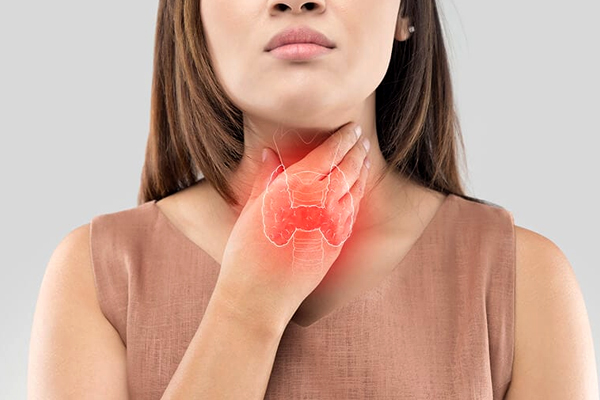Thyroid Disorders

Thyroid Disorders
What are Thyroid Disorders?
Thyroid disorders are a group of medical conditions that affect the thyroid gland, a small, butterfly-shaped gland located at the front of the neck. The thyroid produces hormones that regulate metabolism, energy levels, heart rate, and body temperature. When the thyroid doesn’t function properly, it can lead to a range of health issues that impact overall well-being.
Thyroid disorders are broadly categorized into two types: those that cause the thyroid to produce too much hormone (hyperthyroidism) and those that result in too little hormone (hypothyroidism).
Common Types of Thyroid Disorders
-
Hypothyroidism
Hypothyroidism occurs when the thyroid gland doesn't produce enough thyroid hormone. It can slow down various bodily functions, leading to symptoms such as:- Fatigue and sluggishness
- Weight gain
- Sensitivity to cold
- Dry skin and hair
- Constipation
- Depression or memory problems
- Slow heart rate
The most common cause of hypothyroidism is Hashimoto's thyroiditis, an autoimmune condition where the body attacks the thyroid gland.
-
Hyperthyroidism
Hyperthyroidism results from the overproduction of thyroid hormone, speeding up metabolic processes. Symptoms of hyperthyroidism include:- Rapid heartbeat (palpitations)
- Unexplained weight loss
- Nervousness or irritability
- Tremors or shaking
- Excessive sweating
- Heat intolerance
- Sleep disturbances
- Increased bowel movements
Graves' disease, an autoimmune condition, is the most common cause of hyperthyroidism.
-
Goiter
A goiter refers to an abnormal enlargement of the thyroid gland. While not all goiters cause thyroid dysfunction, they can sometimes result in overactive or underactive thyroid hormone production. A goiter can cause symptoms like:- Swelling in the neck
- Difficulty swallowing or breathing
- Coughing or a hoarse voice
Goiters can be caused by iodine deficiency, autoimmune disorders like Hashimoto's or Graves' disease, or thyroid nodules.
-
Thyroid Nodules
Thyroid nodules are lumps or growths in the thyroid gland. Most nodules are benign, but a small percentage may be cancerous. Symptoms of nodules may include:- A visible lump in the neck
- Difficulty swallowing
- Hoarseness
- Sometimes no symptoms at all
Nodules are often discovered during routine medical exams or imaging studies, and further testing may be needed to determine if they are benign or malignant.
-
Thyroid Cancer
Thyroid cancer occurs when malignant cells form within the thyroid tissue. Though thyroid cancer is relatively rare, it is usually treatable, especially if detected early. Common types include papillary, follicular, medullary, and anaplastic thyroid cancer. Symptoms may include:- A lump or swelling in the neck
- Pain in the neck or throat
- Difficulty swallowing
- Hoarseness or voice changes
- Swollen lymph nodes
Causes and Risk Factors of Thyroid Disorders
Thyroid disorders can arise from a variety of causes, including:
- Autoimmune disorders: Conditions like Hashimoto's thyroiditis and Graves' disease lead to immune system attacks on the thyroid gland.
- Iodine deficiency: A lack of iodine in the diet can result in goiter or hypothyroidism, as iodine is essential for producing thyroid hormones.
- Genetics: A family history of thyroid disorders increases the likelihood of developing similar conditions.
- Radiation exposure: Radiation therapy to the head or neck area or exposure to environmental radiation can increase the risk of thyroid problems, including cancer.
- Pregnancy: Some women develop thyroid disorders during or after pregnancy, known as postpartum thyroiditis.
Diagnosis of Thyroid Disorders
Diagnosing thyroid disorders involves several tests to assess thyroid function and check for underlying causes. These tests may include:
- Blood tests: To measure levels of thyroid hormones (T3 and T4), thyroid-stimulating hormone (TSH), and thyroid antibodies.
- Ultrasound: To evaluate the size of the thyroid gland and detect nodules or cysts.
- Thyroid scan: To assess thyroid function and detect areas of overactivity or underactivity.
- Biopsy: In cases of thyroid nodules, a fine needle aspiration biopsy may be conducted to determine if the nodule is cancerous.
Treatment of Thyroid Disorders
The treatment for thyroid disorders depends on the specific condition and its severity.
-
Hypothyroidism treatment:
The primary treatment for hypothyroidism is hormone replacement therapy with synthetic thyroid hormones, such as levothyroxine. This helps restore normal hormone levels and alleviates symptoms. -
Hyperthyroidism treatment:
Options for treating hyperthyroidism include:- Antithyroid medications: These drugs reduce thyroid hormone production.
- Radioactive iodine therapy: This treatment destroys overactive thyroid cells, reducing hormone levels.
- Surgery: In some cases, part or all of the thyroid gland may need to be surgically removed.
-
Goiter and nodule treatment:
Treatment for goiters or thyroid nodules depends on their size and symptoms. Small, benign goiters may not require treatment, while larger ones that cause symptoms may be treated with medication or surgery. -
Thyroid cancer treatment:
Treatment for thyroid cancer typically involves surgery to remove the cancerous tissue, followed by radioactive iodine therapy or other treatments, depending on the type and stage of the cancer.
Managing Thyroid Disorders
With proper treatment and regular monitoring, most thyroid disorders can be effectively managed. Individuals with thyroid disorders should work closely with an endocrinologist to ensure their condition remains under control. Regular follow-up appointments and adjustments to medication or treatment plans are crucial for maintaining a healthy balance of thyroid hormones.